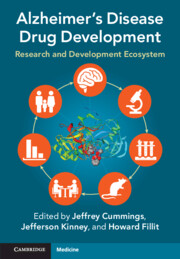Book contents
- Alzheimer’s Disease Drug Development
- Alzheimer’s Disease Drug Development
- Copyright page
- Dedication
- Contents
- Contributors
- Foreword
- Acknowledgments
- Section 1 Advancing Alzheimer’s Disease Therapies in a Collaborative Science Ecosystem
- Section 2 Non-clinical Assessment of Alzheimer’s Disease Candidate Drugs
- 7 Role of Animal Models in Alzheimer’s Disease Drug Development
- 8 Use of Induced Pluripotent Stem Cell-Derived Neuronal Disease Models from Patients with Familial Early-Onset Alzheimer’s Disease in Drug Discovery
- 9 Preclinical Longitudinal In Vivo Biomarker Platform for Alzheimer’s Disease Drug Discovery
- 10 Biobanking and Biomarkers in the Alzheimer’s Disease Drug-Development Ecosystem
- Section 3 Alzheimer’s Disease Clinical Trials
- Section 4 Imaging and Biomarker Development in Alzheimer’s Disease Drug Discovery
- Section 5 Academic Drug-Development Programs
- Section 6 Public–Private Partnerships in Alzheimer’s Disease Drug Development
- Section 7 Funding and Financing Alzheimer’s Disease Drug Development
- Index
- References
9 - Preclinical Longitudinal In Vivo Biomarker Platform for Alzheimer’s Disease Drug Discovery
from Section 2 - Non-clinical Assessment of Alzheimer’s Disease Candidate Drugs
Published online by Cambridge University Press: 03 March 2022
- Alzheimer’s Disease Drug Development
- Alzheimer’s Disease Drug Development
- Copyright page
- Dedication
- Contents
- Contributors
- Foreword
- Acknowledgments
- Section 1 Advancing Alzheimer’s Disease Therapies in a Collaborative Science Ecosystem
- Section 2 Non-clinical Assessment of Alzheimer’s Disease Candidate Drugs
- 7 Role of Animal Models in Alzheimer’s Disease Drug Development
- 8 Use of Induced Pluripotent Stem Cell-Derived Neuronal Disease Models from Patients with Familial Early-Onset Alzheimer’s Disease in Drug Discovery
- 9 Preclinical Longitudinal In Vivo Biomarker Platform for Alzheimer’s Disease Drug Discovery
- 10 Biobanking and Biomarkers in the Alzheimer’s Disease Drug-Development Ecosystem
- Section 3 Alzheimer’s Disease Clinical Trials
- Section 4 Imaging and Biomarker Development in Alzheimer’s Disease Drug Discovery
- Section 5 Academic Drug-Development Programs
- Section 6 Public–Private Partnerships in Alzheimer’s Disease Drug Development
- Section 7 Funding and Financing Alzheimer’s Disease Drug Development
- Index
- References
Summary
The incorporation of target engagement, efficacy, and imaging abnormalities biomarkers on preclinical (animal) drug development brings the promise of accelerating drug development. In this chapter, we will highlight innovative methodological considerations that will bring greater predictive power relative to the traditional approaches in the preclinical stage of drug discovery. First, we discuss various animal models used in Alzheimer’s disease research and important aspects to consider when choosing the appropriate model to test a novel therapeutic intervention. Second, compared to the traditional histological methods, utilizing in vivo biomarkers in preclinical assessment allows quantifying disease pathophysiology with complex longitudinal designs. We discuss the feasibility and implications of longitudinal study designs and how the same in vivo biomarkers used in human clinical trials can be implemented to evaluate the preclinical development stages. Lastly, we discuss why the incorporation of methods from human clinical trials can advance the preclinical phases of drug discovery.
Keywords
- Type
- Chapter
- Information
- Alzheimer's Disease Drug DevelopmentResearch and Development Ecosystem, pp. 106 - 122Publisher: Cambridge University PressPrint publication year: 2022

